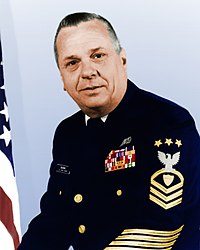Charles Calhoun
| Charles L. Calhoun | |
|---|---|
 
Charles Calhoun
|
|
| Born |
April 20, 1925 Ocean City, Maryland |
| Died | February 24, 2002 (aged 76) Santa Rosa, California |
| Allegiance | United States of America |
| Service/branch |
United States Navy United States Coast Guard |
| Years of service | 1943–1946 (Navy) 1946–1973 (Coast Guard) |
| Rank | Torpedoman Second Class (Navy) Master Chief Petty Officer of the Coast Guard |
| Battles/wars |
World War II Vietnam War |
| Awards |
Commandant's Letter of Commendation Ribbon Legion of Merit Presidential Unit Citation Navy Unit Commendation |
Charles Luther Calhoun (April 20, 1925 – February 24, 2002) was an American military enlisted man who served briefly in the United States Navy during World War II and then in the United States Coast Guard where he would rise to become the first Master Chief Petty Officer of the Coast Guard.
Charles Calhoun was born April 20, 1925 in Ocean City, Maryland and lived very close to the coast throughout his childhood. His grandfather was a commercial fisherman who taught Calhoun how to fish as a boy. He joined the United States Navy in 1943 at the age of 17 and was trained as a torpedoman. He served on the USS Lunga Point in the Pacific Ocean theater of World War II. He participated in many of the bloodiest battles of the theater, including the battles of Leyte Gulf, Luzon, Iwo Jima, and Okinawa. The Lunga Point's crew received the Navy Unit Commendation for "extraordinary heroism and action against enemy Japanese forces in the air, ashore, and afloat" following a kamikaze attack on the ship. Calhoun was honorably discharged from the Navy on February 21, 1946.
Calhoun returned to Ocean City and worked in the post office for a short period, but enlisted in the United States Coast Guard with a friend on September 20, 1946. He enlisted at the rank of Boatswain’s Mate Second Class due to his Navy experience. His first assignment was to a small station in Ocean City. There he saved a man who had fallen from a jetty into the water and broken his hip. Calhoun was awarded the Commandant's Letter of Commendation Ribbon for the rescue. He would later serve with Coast Guard Squadron One aboard the USCGC Point Orient during the Vietnam War. The cutter sighted and fought enemies on her first patrol, making the Point Orient the first Coast Guard cutter to fire shots in the Vietnam War.
...
Wikipedia
